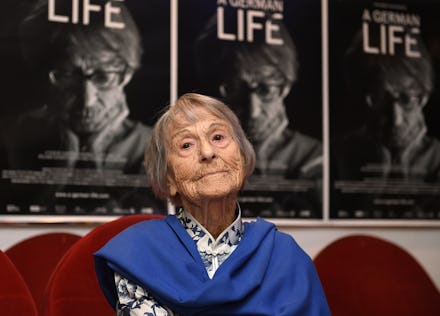Brunhilde Pomsel, Nazi propaganda chief Joseph Goebbels' secretary, dies at 106

Brunhilde Pomsel, a secretary who worked in Joseph Goebbels' office during the Holocaust, helping one of the worst war criminals of the 20th century to churn out Nazi propaganda, died on Jan. 27 in Munich, the Washington Post reported. She was 106.
An interview with the Guardian published in August — her last in-depth interview of her life — was conducted prior to the release of a documentary called A German Life. The documentary, which has not yet been released in the U.S., "forces viewers to ask themselves what they would have done and whether they would have sacrificed any possible moral principles in order to advance their own careers." Throughout her Guardian interview for the film, Pomsel maintains that she "didn't do anything other than type in Goebbels' office."
Though she was sentenced to five years in various prison camps after the fall of the Third Reich, Pomsel described her work in Goebbels' office at the heart of the Nazi government was "just another job" and that she was completely insulated from the Holocaust.
"I know no one ever believes us nowadays — everyone thinks we knew everything," she said. "We knew nothing, it was all kept well secret." The Guardian reported Pomsel's job duties included "massaging downward statistics about fallen soldiers, as well as exaggerating the number of rapes of German women by the [Russian] Army."
The hidden horrors behind her "just another job" became clear when, as the Third Reich collapsed, she and other members of Goebbels' office were moved into an underground bunker called the Führerbunker, wherein Adolph Hitler and his new wife Eva Braun committed suicide, according to the Guardian. The day after Hitler and Braun killed themselves, Pomsel's boss followed suit by poisoning his six children with cyanide, and then shooting his wife and himself.
Pomsel said in her Guardian interview that after she learned of this news, delivered by Goebbels' assistant Günther Schwägermann, she and the other secretaries were "dumbstruck" and proceeded to tear apart food sacks to turn into a surrender flag.
The BBC notes that while Pomsel identified as apolitical, she joined the Nazi party in 1933 so she could obtain a government job working at a German national radio. In 1942, she says in her Guardian interview, someone recommended her to work at the ministry of propaganda because she was "the fastest typist at the radio station." The Guardian reported Pomsel said she was "flattered" and had no reservations about taking the job: "Only an infectious disease would have stopped me."
The Post notes that, until A German Life, Pomsel lived as one of the last surviving members of the Nazi's "most intimate staff" in total obscurity. After her release from prison, the Guardian reported, Pomsel obtained another secretarial job and lived a fairly comfortable life, "relieved I never had any children that I have to worry about," and retired at age 60.
According to the Guardian, Pomsel insisted that those who claim today that they would have stood up against the Nazis actually wouldn't have, because the circumstances surrounding that fight were dangerous.
"Those people nowadays who say they would have stood up against the Nazis — I believe they are sincere in meaning that, but believe me, most of them wouldn't have ... I could open myself up to the accusations that I wasn't interested in politics but the truth is, the idealism of youth might easily have led to you having your neck broken," she said.
Aware that this would be her last in-depth interview, Pomsel told the Guardian, "I just cling to the hope that the world doesn't turn upside down again as it did then, though there have been some ghastly developments, haven't there?"